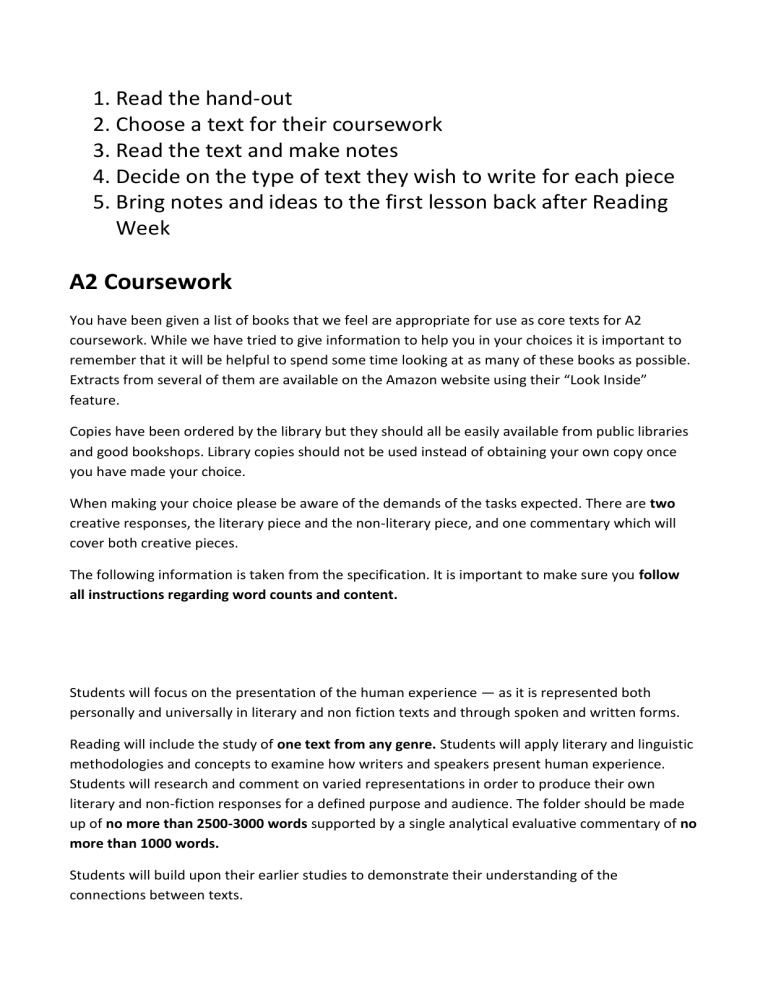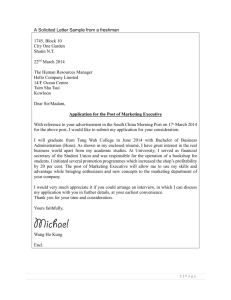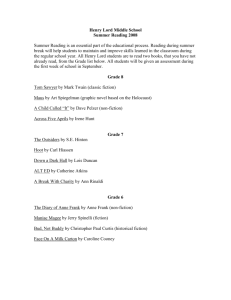English Language & Literture

1.
Read the hand-out
2.
Choose a text for their coursework
3.
Read the text and make notes
4.
Decide on the type of text they wish to write for each piece
5.
Bring notes and ideas to the first lesson back after Reading
Week
A2 Coursework
You have been given a list of books that we feel are appropriate for use as core texts for A2 coursework. While we have tried to give information to help you in your choices it is important to remember that it will be helpful to spend some time looking at as many of these books as possible.
Extracts from several of them are available on the Amazon website using their “Look Inside” feature.
Copies have been ordered by the library but they should all be easily available from public libraries and good bookshops. Library copies should not be used instead of obtaining your own copy once you have made your choice.
When making your choice please be aware of the demands of the tasks expected. There are two creative responses, the literary piece and the non-literary piece, and one commentary which will cover both creative pieces.
The following information is taken from the specification. It is important to make sure you follow all instructions regarding word counts and content.
Students will focus on the presentation of the human experience — as it is represented both personally and universally in literary and non fiction texts and through spoken and written forms.
Reading will include the study of one text from any genre. Students will apply literary and linguistic methodologies and concepts to examine how writers and speakers present human experience.
Students will research and comment on varied representations in order to produce their own literary and non-fiction responses for a defined purpose and audience. The folder should be made up of no more than 2500-3000 words supported by a single analytical evaluative commentary of no
more than 1000 words.
Students will build upon their earlier studies to demonstrate their understanding of the connections between texts.
Students will demonstrate that they can research independently and write with the appropriate regard for audiences, purpose and format.
Coursework folder: 2500-3000 words maximum own writing; 1000 words maximum commentary
80 marks
A chosen area of human experience and texts related to this choice will form the basis of the coursework folder.
Students will produce a coursework folder of three pieces of writing:
1 one piece of literary writing — eg section of writing which presents a factual event through narration
2 one piece of non-fiction writing — eg an analytical comment article for a broadsheet newspaper
3 an analytical evaluative commentary.
There should be a balance of the word count across the two pieces of student work.
Preparation for this unit should include choosing a topic area of sufficient scope to provide the students with existing examples of literary and non-fiction writing across a range of genres. The topic area provides the unifying feature which will allow the students to analyse texts on a spectrum from literary to non-fiction.
The texts chosen in the topic area should be of sufficient challenge to enable students to achieve across the full range of marks.
The commentary should be a single piece of evaluative writing in which both the literary and the non-fiction writing are discussed. Reference should be made in the commentary to the influence of the work of other writers on the students’ own work as observed in the period of reading and reflection.
It is the centre’s responsibility to inform students that there is no tolerance on the prescribed
word limit. Students are required to include a cumulative word count at the bottom of each page.
Teacher-assessors and moderators will discontinue marking once the prescribed word limit is reached.
Details of learning content:
Unit 4 requires students to synthesise and reflect on their knowledge and understanding of literary and linguistic concepts and approaches gained throughout the course and to make creative connections between elements of the course as a whole.
What students need to learn:
Show their understanding of the significance of contextual factors both in their own writing and in their reading of texts.
Use literary and linguistic approaches in their response to and interpretation of texts.
Create, draft, edit and evaluate the effectiveness of their own texts.
Show evidence of independent research, including references to quotations and sources.
Suggested Books for Unit 4
Bram Stoker
—
Donna Tartt
—
Barack Obama
—
Kazuo Ishiguru
—
Bill Bryson
—
Albert Camus
—
Margaret Atwood
John Fowles
Joanne Harris
—
RJ Ellory
—
—
—
Dracula
The Secret History
Dreams From My Father
Never Let Me Go
Notes From A Small Island
The Life and Times of the Thunderbolt Kid
The Outsider
Surfacing
The Collector
Chocolat
A Quiet Belief in Angels
Philipp Meyer
—
American Rust
Dracula is an 1897 novel by Irish author Bram Stoker, featuring as its primary antagonist the vampire Count
Dracula.
Dracula has been attributed to many literary genres including vampire literature, horror fiction, the gothic novel and invasion literature. Structurally it is an epistolary novel, that is, told as a series of diary entries and letters. Literary critics have examined many themes in the novel, such as the role of women in Victorian culture, conventional and conservative sexuality, immigration, colonialism, postcolonialism and folklore.
Although Stoker did not invent the vampire, the novel's influence on the popularity of vampires has been singularly responsible for many theatrical, film and television interpretations throughout the 20th and 21st centuries.
The Secret History is set at a fictional college that closely resembles Tartt's alma mater. The plot concerns a close-knit group of six students and their professor of classics. The students embark upon a secretive plan to stage a bacchanal. The first-person narrative is flavored heavily by the differences within the group. These include: social class, privilege, intellect and sexual orientation. The narrator reflects on a variety of circumstances that lead ultimately to a murder within the group.
The fact of the murder, the location and the perpetrators are revealed in the opening pages, usurping the familiar framework and accepted conventions of the murder mystery genre. Critic A.O. Scott labeled it "a murder mystery in reverse.”
Dreams From My Father – Whatever else people expect from a politician, it’s not usually a beautifully written personal memoir steeped in honesty. Barack Obama has produced one, possibly because he wrote it when he was 33, long before realising any political ambitions. In essence, this is the search for his lost father who left when Obama was two, and whom he met only once, when he was ten.
Obama writes candidly about himself as well as about the race divisions that maim America. He delineates people with a rare skill, using individual shortcomings to describe the hurt and failure of a whole society.
Never Let Me Go - The narrator is a “carer” who is trying to make sense of her life and the lives of other
“carers” and “donors”. Set in the late 1990’s it creates a parallel universe with a society which is both familiar and horrifying. Using elements of science fiction (but very little science and technology) Ishiguro creates an at times mundane world where a terrifying story about what it is to be a human being slowly takes compelling shape.
Notes from a Small Island was written when Bill Bryson had decided to move back to his native United
States but wanted to take one final trip around Great Britain, which had been his home for over twenty years. Bryson covers all corners of the island observing and talking to people from as far afield as Exeter in the southwest of England to John O'Groats at the north-eastern tip of Scotland.
The Life and Times of the Thunderbolt Kid is a memoir by Bill Bryson. The book delves into Bryson's past and tells of his youth growing up in Des Moines, Iowa, during the 1950s and early 1960s. It also reveals the backstory between himself and Stephen Katz, among other mentioned characters in his travel works. Bryson also describes and comments on American life in the 1950s. The title of the book comes from an old college football jumper with a lightning strip down that middle that Bryson found when he was six or so.
The Outsider, Albert Camus's first novel, is both a brilliantly crafted story and an illustration of Camus's absurdist world view. Published in 1942, the novel tells the story of an emotionally detached, amoral young man named Meursault. He does not cry at his mother's funeral, does not believe in God, and kills a man he barely knows without any discernible motive. For his crime, Meursault is deemed a threat to society and sentenced to death. When he comes to accept the “gentle indifference of the world,” he finds peace with himself and with the society that persecutes him.
First Love Last Rites is McEwan's first published work and was regarded by the author (along with his second collection of short stories, In Between the Sheets) as an opportunity to experiment and find his voice as a writer. In an interview with Christopher Ricks in 1979, McEwan commented, "They were a kind of laboratory for me. They allowed me to try out different things, to discover myself as a writer." As a piece of work that portrays McEwan, the writer, at his youngest, it is perhaps fitting that the dominant theme is that of adolescence, of that blurry and perilous divide between childhood and adulthood; in addition themes of sex, perversion, and the grotesque in its many forms feature throughout.
Surfacing grapples with notions of national and gendered identity in a story of a woman who returns to her hometown in Canada to find her missing father. Accompanied by her lover and another married couple, the unnamed protagonist meets her past in her childhood house, recalling events and feelings while trying to find clues for her father's mysterious disappearance. Little by little, the past overtakes her and drives her into the realm of wildness and madness.
The Collector’s central character is Frederick, a butterfly collector (who prefers to be called Ferdinand), who decides to "collect" the long-admired-from-a-distance object of his fantasy, an art student named Miranda.
Frederick keeps Miranda prisoner in a room in his secluded basement. All he wants is for Miranda to love him and, other than keeping her prisoner, he treats her like a queen, fulfilling her every need or want.
The Collector established Fowles’ reputation as a writer of what The Sunday Times called, “great imaginative power.” Immediately engaging, The Collector works by stealth, its creepiness slowly crowding you, until the experience of reading the novel becomes almost as claustrophobic as the captivity in which one of the protagonists is held.
Chocolat tells the story of Vianne Rocher, a young mother, who arrives at a fictional insular French village of
Lansquenet-sous-Tannes with her six-year-old daughter, Anouk. Vianne opens La Céleste Praline, a small chocolaterie, and her confections quickly begin to change the lives of the townspeople through magic, setting up a conflict with Francis Reynaud, the parish curate. Chocolat is a recent contribution to the literary stream of Magic Realism.
A Quiet Belief in Angels is a sensitively realised crime novel set in America. Joseph Vaughan's life has been dogged by tragedy. Growing up in the 1950s, he was at the centre of series of killings of young girls in his small rural community. The girls were taken, assaulted and left horribly mutilated.
Barely a teenager himself, Joseph becomes determined to try to protect his community and classmates from the predations of the killer.
"R.J. Ellory is a uniquely gifted and powerful writer. The quality is his prose lifts A Quiet Belief in Angels far above genre."
A riveting mystery; as compelling as it's moving. Beautifully written, with a bleak poetry that makes you yearn to read aloud. Think Salinger meets Chandler."
"Original and complex; the book will stay with you long after you've closed the pages and stared into the darkness beyond your own bedroom window."
"Combining a poetic literary style with a stunning mystery story, R.J. Ellory will quickly rank with the best crime writers working today"
American Rust.
Set in a beautiful but dying Pennsylvania steel town, American Rust is a novel of the lost American dream and the desperation that arises from its loss. It is the story of two young men bound to the town by family, responsibility, inertia and the beauty around them who dream of a future beyond the factories, abandoned homes, and the polluted river. Isaac is the smartest kid in town, left behind to care for his sick father after his mother commits suicide and his sister Lee moves away. Now Isaac wants out too. Not even his best friend, Billy Poe, can stand in his way: broadshouldered Billy, always ready for a fight, still living in his mother's trailer. Then, on the very day of
Isaac's leaving, something happens that changes the friends' fates and tests the loyalties of their friendship and those of their lovers, families, and the town itself. Evoking John Steinbeck's novels of restless lives during the Great Depression, American Rust is an extraordinarily moving novel about the bleak realities that battle our desire for transcendence, and the power of love and friendship to redeem us.
Capital by John Lancaster The book follows a small cross-section of the inhabitants of one south
London street, and the people who come to work for them, over a year, in which the settled citizens interact with the newcomers who are trying to negotiate a place for themselves in British society.
Among them are a Polish man working as a builder, a well-educated Hungarian woman who takes a job as a nanny, a Senegalese footballer being groomed for stardom at great expense, and also
Quentina, a hated local traffic warden, who is a political refugee from Zimbabwe with a university degree, and can support herself only by paying for a forged work permit. All of them have to be
tough, drawing on their wits, prepared to adapt themselves to what is required, ready to accept and brush aside humiliation. Their experience of London counterpoints with that of the luckier inhabitants.
The street Lanchester has imagined, Pepys Road, is one built for lower middle-class families in the late 19th century, and the story begins in December 2007, when the value of each house has risen so spectacularly that the people who currently own them are all rich, and have done much knocking through and enlargement of attics and basements, congratulating themselves on their good luck as they do so. "Having a house in Pepys Road was like being in a casino in which you were guaranteed to be a winner. If you already lived there, you were rich. If you wanted to move there, you had to be rich. It was the first time in history this had ever been true" – a truth universally acknowledged by
Suggested Reading for A2 Language and Literature Unit 4
Main Text
Dracula
Author
Bram Stoker
Bram Stoker
Anne Rice
Wikipedia article
Wider Reading
The Judge’s House
Interview with the
Vampire
Gothic Architecture
Comment
C19 Gothic
Horror
Short story fiction
Non fiction
Source
Bookshop
School
Bookshop / Library
Fred Botting
David Else
Gothic
Lonely Planet England p
647
Non fiction
Travel
Writing. http://en.wikipedia.org/wiki
/Main_Page
Bookshop / Library http://www.google.co.uk/b ooks
Donna Tartt Bookshop The Secret
History
Stieg Larsson Bookshop/Library
Annie Proulx
Donna Tartt
The Girl With the
Dragon Tattoo
Fiction
Brokeback Mountain short story
The Little Friend fiction
Bookshop/Library
Bookshop/Library
Richard Garner
Donna Tartt Profile Internet article http://www.guardian.co.uk/books
/2002/oct/19/fiction.features
Social Class
“determines child’s successs” newspaper article http://www.independent.co.uk/ne ws/education/educationnews/social-class-determineschilds-success-934240.html
Michael S Kimmel Privilege: a reader non-fiction http://books.google.co.uk/books
Dreams From My
Father
Barack
Obama
Barack
Obama
Michael
Moriarty
Snarkeratti
Ella
Saltmarshe
Speeches 2002 -
06
Big Hollywood
“The Damned
Don’t Cry”
Blog
Martin Amis Money
Mahatma
Gandhi
The Story of my
Experiments with
Truth fiction autobiography
Never Let Me Go Kazuo
Ishiguru
Kazuo
Ishiguru
Aldous
Huxley
George
Orwell
Margaret
Atwood
Earl G.
Ingersoll
The Remains of the Day fiction
Brave New World fiction
1984
The Handmaids
Tale
Taking off into the Realm of metaphor fiction fiction critical essay
Bookshop www.books.google.uk
http://bighollywood.breitbart.com/aut hor/mmoriarty/
Bookshop/Library www.books.google.uk
Bookshop
Bookshop/library
Bookshop/library
Bookshop/library
Bookshop/library
Top 50 Dystopia
Movies of all time internet article
Are we drowning in dystopias? internet article http://findarticles.com/p/articles/mi_h b6526/is_1_34/ai_n29399649/ http://snarkerati.com/movienews/the-top-50-dystopian-movies-ofall-time/ http://www.treehugger.com/files/200
9/12/are-we-drowning-indystopias.php
Notes From A
Small Island
James
Belasco
Al Gore
Bill Bryson
Meals to Come Non fiction
An Inconvenient
Truth non-fiction www.books.google.co.uk
www.books.google.co.uk
Travel / autobiography bookshop
J M Barrie Peter Pan
David Pelzer A Child Called It
Nicole Lea
Helget
The Summer of
Ordinary Ways
Sue William
Silverman
Shine the Light fiction
Madhur
Jaffrey
Climbing the
Mango Trees memoir
Bill Bryson set to be CPRE’s new
President
Internet press
Release
Roald Dahl
Museum of
Childhood
Blackwell Handbook of
Early Childhood
Development
Boy
Bookshop/library
Bookshop/library
Bookshop/library
Bookshop/library
Bookshop/library website non – fiction autobiography http://www.cpre.org.uk/news/view/38
2 http://www.vam.ac.uk/moc/ www.books.google.co.uk
Bookshop/library
Kate Fox Watching the English The Hidden Rules of
English Behaviour
Bookshop/library
George Orwell Homage to Catalonia travelogue Bookshop/library
Surfacing
The Outsider Albert Camus bookshop
Albert Camus
Franz Kafka
Joseph Conrad
Spike magazine
The Fall
Metamorphosis
Heart of Darkness
Interview with
Catherine Camus fiction short story fiction
Internet magazine non fiction
Bookshop/library
Bookshop/library
Bookshop/library http://www.spikemagazine.com/08
99camu.php
www.books.google.co.uk
Steve Earnshaw Existentialism: A
Guide for the perplexed
Marx’s Theory of
Alienation
Wikipedia article http://en.wikipedia.org/wiki/Marx' s_theory_of_alienation
Margaret Atwood
Margaret Atwood Oryx and Crake
Alice Walker The Color Purple
Tim Winton
Bruce Chatwin
Dirt Music
Songlines fiction fiction fiction fiction
Hwee Hwee Tan Foreign Bodies
Linda Marina fiction
Woman and the land internet article bookshop
Bookshop/library
Bookshop/library
Bookshop/library
Bookshop/library
Bookshop/library http://www.lancs.ac.uk/staff/twine
/ecofem/linda.pdf
The Collector John Fowles bookshop
John Fowles
David Baldacci
Diana M.
Concannon
John Elsner
Roger Cardinal
Transcript of a BBC interview with John
Fowles – 1997 http://www.fowlesbooks.com/BBC
%20interview.htm
“The Ebony Tower “ Short stories Bookshop/library
Bookshop/library
First Family
Crime
Thriller
Index of Criminal
Profiles
The Cultures of
Collecting
Weblinks
Kidnapping: An
Investigator’s Guide to Profiling
Non-fiction
Non-fiction http://www1.csbsju.edu/uspp/rese arch/Index-Criminal.html
www.books.google.co.uk
www.books.google.co.uk
Chocolat Joanne Harris fiction bookshop
Joanne Harris
Joanne Harris
Nigel Slater
Alex Szoygi
The Lollipop Shoes Fiction
(sequel to
Chocolat)
Bookshop/library
Short stories Bookshop/library Jigs and Reels
Eating for England
Aztec Food
Chocolate: Food of the Gods
Food writing http://books.google.co.uk
Internet
Article
Non -fiction http://www.aztechistory.com/aztec-food.html
http://books.google.co.uk
Robin Rose
Bennett
Healing Magic: A
Green Witch
Guidebook
Non-fiction http://books.google.co.uk
A Quiet Belief in
Angels
R J Ellory Bookshop
R J Ellory
Harlan Coben
Erwin James
Robert
Mc Farland
Arthur Conan
Doyle
Clarence Darrow
Simon Baatz
R J Ellory: Biography Internet
Article
City of Lies fiction http://www.rjellory.com/Biog.aspx
Bookshop/library
No second Chance”
Raoul Moat never really had a future fiction
Internet article
Bookshop/library http://www.guardian.co.uk/comme ntisfree/2010/jul/12/raoul-moatmedia-future-life
Is the police force structure fit for purpose?
“The Hound of the
Baskervilles”
Internet news article
Sherlock
Holmes mystery
Crime: Its Causes and treatment non-fiction http://www.guardian.co.uk/profile/ robert-mcfarland
Bookshop/library http://books.google.co.uk
Phillip Meyer bookshop American Rust
Cormac McCarthy The Road
John Steinbeck “The Grapes of
Wrath”
Wikipedia Article Rust Belt fiction fiction
Non fiction
Bookshop/library
Bookshop/library
John A Fitch
Charles Dickens
“The Steel Workers Non-fiction
“Hard Times” fiction http://en.wikipedia.org/wiki/Manu facturing_Belt http://books.google.co.uk
Bookshop/library
Text Transformation.
Whichever text you have chosen the best way to maximise your potential for high marks is to choose a literary approach that it closely linked to your original text.
Here are some suggestions:
Take your text and –
develop correspondence between characters. A significant character writes to someone about events in the book, reflecting on their significance, effect and the behaviour/motivation of other characters
write a diary/journal. A character (or characters) keeps a journal reflecting on events (their significance, effect and the behaviour/motivation of other characters)
if the original is in first person rewrite part of it in third (or even second) person
rewrite an important part of the text as a play for radio
rewrite a section from another character’s point of view
create an extra chapter
By keeping close to the original you will find it easier to meet the assessment criteria.
In your commentary you need to write about
– genre and the way your piece has used genre conventions viewpoint/narrative voice/perspective use of speech lexis/choice of words (nouns, verbs, modifiers) syntax (sentence types and word order) and its effects literary/figurative language (metaphor, simile, symbolism) rhetorical features – repetition, juxtaposition (the effect created by placing ideas together), listing, parallelism (the balance of two or more similar words or phrases), rhetorical questions, connotation (a feeling or idea suggested by a particular word or phrase even though it may not be part of the word or phrase’s meaning) narrative/authorial intention
– to characterise, persuade, set the scene, inform, evoke atmosphere, advise reflections on wider reading – influences, features etc.. Don’t just refer to your core text.
You will be given a detailed coursework guidance sheet.
You will be given detailed feedback in the form of annotated suggestions from your teacher about how to improve your draft creative pieces and your commentary.
Deadlines will be firmly adhered to both for drafts and for final submissions.
Name _________________________
Edexcel Language and Literature Unit 4
“Presenting the World” Coursework Proposal to be presented to your teacher on the first English lesson in September 2015
Core Text
Wider Reading
Task 1 Literary
Task 2 Non-literary






